troubleman84
Proud Member
Nearly 50 years after a young black boxer-turned-songwriter from Detroit formed Tamla Recording Company, the sounds of his Motown Records acts still resonate with generations of music lovers. Motown indeed helped to bridge the rigid color lines in their effort to mixed pop melodies with soulful grooves creating a sound that is forever indebted to pop culture. Let's look back at the label's unique history:
Berry Gordy's Motown Records
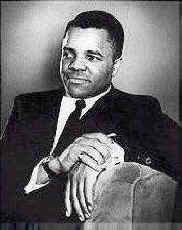
Founder and owner of the Tamla-Motown family record labels, Berry Gordy, Jr., established Motown Records as one of the most important independent labels in the early '60s. Assembling an industrious staff of songwriters, producers, and musicians, Motown Records built one of the most impressive rosters of artist in the history of pop music and became the largest and most successful independent record company in the United States by 1964.
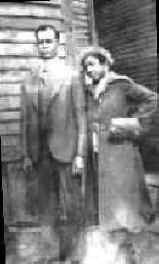
Berry, Sr. and Bertha Gordy
On November 28, 1929 Berry Gordy was born at Detroit's Harper Hospital. Gordy was the seventh child born to Berry and Bertha Gordy. The Gordys an ambitious middle-class family with roots in Georgia farming and retailing.. The family moved to Detroit in the 1922 with their first three children. It was here that they established a successful painting and construction business that allowed the family to purchase a commercial building on the corner of St. Antoine and Farnsworth. Berry Gordy Sr. also opened the Booker T. Washington grocery store and from which he instilled the values of frugality, discipline, family unity and hard work that were so dear to Booker T. Washington. After studying business in college, Bertha co-founded the Friendship Mutual Life Insurance Company.
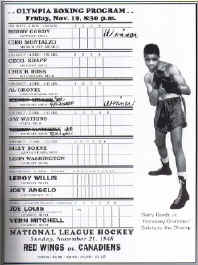
Berry Gordy dropped out of school in the eleventh grade to become a professional boxer. At one time he even fought on the same card with the Brown Bomber Joe Louis at Detroit's Olympia Stadium. He ended a his respectable career as a featherweight in 1950. After serving in the Army in Korea from 1951-1953 his love for jazz caused him to open up the 3-D Record Mart - House of Jazz. To obsessed with his own love of Jazz, Berry was to stubborn to stock the Blues records the neighborhood craved. So in 1955 the store went bankrupt and was forced to close.
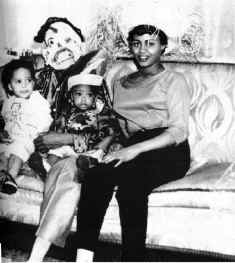
Berry married married Thelma Coleman and quickly had three children. It was after the closing of the record store that Gordy went to work on the assembly line at Ford's Lincoln-Mercury plant. By 1957, he had quit that job to become a professional songwriter.
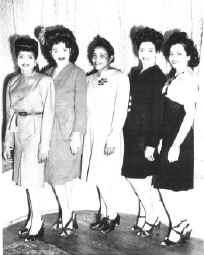
The Gordy sisters and mother: Esther, Anna, mother Bertha, Gwen and Lourye
The Flame Show Bar opened in 1949 and was located at the corner of John R and Canfield. The Flame was the showplace for top Black talent in Detroit during the 50s. Billie Holiday, T-Bone Walker, Wynonie Harris were a few of the many great black entertainers that appeared there. The Berry's were in charge of the photo concessions at the Flame. Sisters Gwen and Anna took the photos with brothers George and Robert developing the film. It was during this time the Al Green the club's owner invited Gordy to write songs for the artists he managed which included Jackie Wilson. Berry teaming with Roquel "Billy" Davis began writing at Green's office. Berry would eventually bring sister Gwen in and the trio would write several bestsellers "to Be Loved," "Lonely Teardrops," "That's Why (I Love You So)" and "I'll Be Satisfied" establishing themselves as hit writers. At this time Gordy started doing some of the producing.
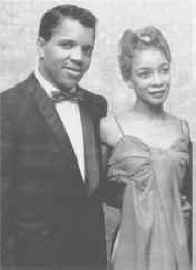
Berry Gordy and second wife Raynoma Liles
One day Raynoma Liles and her sister Alice auditioned for Gordy. Not only did Gordy meet his next wife Raynoma, but he found a lady who could help him write hit records. Known around the company as Miss Ray, she had perfect pitch and could write lead sheets. They soon formed the Rayber Music Writing Company and for $100 they would do whatever was necessary to help a young singer make a record, be it writing, arranging, rehearsing or recording a demo. In this way they were able to find new talent. They also put together the Rayber Voices, a studio group that backed most of Motown's first acts on their early recordings.
In late 1957, Gordy had his first success with "Reet Petite," which was recorded by Detroit born Jackie Wilson, who had replaced Clyde McPhatter as lead singer of the Dominoes. The next year he wrote "Lonely Teardrops" for Wilson.
An unsuccessful audition of the Matadors for Wilson's manager Nat Tarnopol would change Gordy's life. Berry really like them a lot and told them so after the audition. This was to be the beginning of a close friendship between Gordy and the Matador's lead singer Smokey Robinson. The Matadors soon changed their name to the Miracles. Gordy managed the Miracles and produced their 1958 single "Got a Job" on the End Records label. The small royalty check he received from End along with similar small royalty checks for other hits he had co-written convinced him to form his own label Tamla Records. Originally he had wanted to call it Tammy after the Debbie Reynolds ballad, but the name had already been taken.
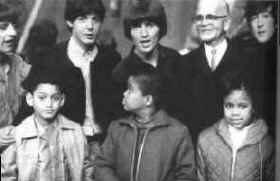
Berry's children Terry, Berry IV and Hazel (Jermaine's future wife) with the Beatles
In 1959 Gordy started his own publishing company Jobete Publishing named after his three children: Hazel Joy, Berry and Terry. If you wrote for Motown you were published by Jobete which grew to be one of the most powerful in the industry.
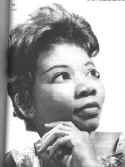
Mabel John, Motown's first female artist
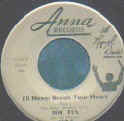
A "45 from Anna Records, a label Berry and sisters Gwen and Anna started.
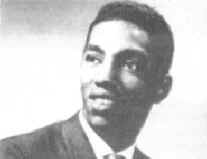
Barrett Strong, the man behind Motown's first top 40 hit, "Money (That's What I Want)" and later the co-songwriter of hits by The Temptations
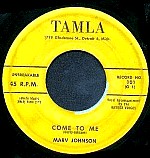
Tamla Records' first 45" released by Detroit R&B legend Marv Johnson, Tamla's first recording act
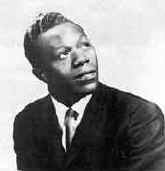
Marv Johnson
Gordy initially recorded R&B artists on Tamla Records. He signed Mabel John, the gospel trained sister of blues singer Little Willie John. Gordy scored a minor hit with Tamla's first release, R&B singer Marv Johnson's "Come To Me." As the record picked up steam Gordy found he could not keep up with the demands of national production and distribution and leased the master to United Artists. Later in the first year of operation he co-wrote and produced "Money," which was recorded by Barrett Strong. Not yet equipped to break a national hit "Money" was released by Anna Records which was owned by his sister Gwen and her husband Harvey Fuqua. "Money" eventually reached the number two spot on the R&B Chart. In November 1959, Gordy recorded "Bad Girl" by a young William "Smokey" Robinson and the Miracles that reached number ninety-three on the pop charts with the help of national distribution by Chess Records.
Smokey Robinson convinced Gordy that Motown should distribute its own records. In 1960, Gordy co-wrote and distributed "Shop Around" by Smokey Robinson and the Miracles, which was a number one hit and established Motown as an important independent company. By this time Gordy had set up the Motown Record Corporation, Hitsville USA and Berry Gordy Enterprises. Jobette Music was his publishing firm and management agency International Talent Management, Inc. He also set up various subsidiary labels.
Through the next four years, Gordy continued to produce hits by capitalizing on the girl group craze. In 1959, a sixteen year old girl, Mary Wells, approached Gordy with a song she had written for Jackie Wilson. Unable to write music, Wells sang the song to Gordy, who immediately signed her and released her version of "Bye, Bye, Baby," which made the Top Ten on the R&B charts in 1960. Two years later she teamed with Smokey Robinson, who now wrote and produced for Tamla label and hit with "The One Who Really Loves You," "You Beat Me To Punch," and "Two Lovers." The next year she recorded "Laughing Boy" and "Your Old Stand By." In 1964 Wells topped the charts with "My Guy."
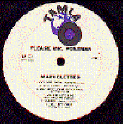
A Tamla 45" of the Marvelettes' "Please Mr. Postman"
Gordy also charted with the Marvelettes. Around 1961, one of their teachers arranged an audition with Gordy, after which he signed them and released "Please Mister Postman," which became Motown's first number one record. The next year the Marvelettes hit the charts with "Playboy," "Beachwood 4-5679," "Someday Someway," and "Strange I Know." In 1962 The group toured the South as part of the first Motortown Revue.
Encouraged by his success with the Marvelettes, Gordy recorded another Detroit girl group, Martha and the Vandellas. Martha Reeves, influenced by Clara Ward and jazz singer Billie Holiday, joined with Annette Sterling, Rosalind Ashford, and Gloria Williamson to sing as the Del-Phis while in high school and record the unsuccessful "I'll Let You Know" for Chess. In 1961 Reeves was hired as a secretary at Motown and by 1962 had convinced Gordy to record her group. The group sang backup vocals on a number of Motown hits including "Hitch Hike" and "Stubborn Kind of Fellow" by Marvin Gaye. Martha and the Vandellas hit the charts with "Come Get These Memories," followed by the million selling "Heat Wave" and "Quicksand." The next year they recorded "Dancing In the Streets" which reached near the top of the charts. Martha and the Vandellas, along with Mary Wells and the Marvelettes, identified Motown as a major source of the girl group sound.
Gordy, the son of a black entrepreneur who hoped for the upward mobility of blacks, specifically groomed and cultivated streetwise teens from the streets of Detroit to make them acceptable to Mainstream America. In 1964 he hired Maxine Powell, who had operated a finishing and modeling school, to prep his performers. Powell tried to transform Motown artists into polished professionals.
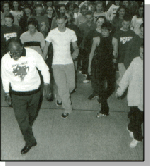
Motown choreographer Cholly Atkins on far left
A few months after adding Maxine Powell, Gordy hired choreographer Cholly Atkins, a well known dancer in the 1930s and 1940s who had performed at the Cotton Club and Savoy Ballroom, to teach these groups how to move gracefully
Atkins worked with Maurice King, who served as executive musical director. King who had arranged shows at Detroit's Flame Show Bar for years and had worked with jazz artists such as Billie Holiday and Dinah Washington, taught the Motown groups about stage patter.
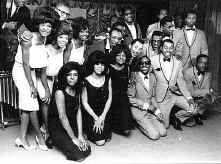
Motown recording stars on the road in England
By the mid-1960s, Gordy had assembled a Motown team that could take poor black youths from Detroit and teach them to talk, walk, dress as successful debutantes and debonair gentleman
Gordy combined the polished images of the Motown acts with a gospel-based music that could appeal to mainstream America. Blues and R&B always had a funky look to it back in those days, and Motown wanted to have a look that fathers and mothers would want their children to follow. They wanted to kill the imagery of liquor and drugs and how some people thought it pertained to R&B. Therefore when they reject anything that had a strong blues sound to it when choosing material for their artist.
In place of the blues and R&B, Gordy favored a distinct music grounded by an insistent pounding rhythm section, punctuated by horns and tambourines and featuring shrill, echo-laden vocals that bounced back and forth in a call and response of gospel. Building upon his experience with the girl group sound, he produced a full sound reminiscent and expanding on Phil Specter's Wall of Sound.

Motown complex on West Grand Boulevard

2657 West Grand Boulevard
After he purchased 2644-2246 West Grand Boulevard in April of 1961 he placed Jobete, the sales, shipping and public relations departments in it. In January of 1962 2650-2652 West Grand Boulevard was added to house Berry and his sister Esther's offices International Talent Management. From 1965 on 2656 hosed finance department; 2662-64 purchased the next year was home to the sales and marketing. 26666-68 was bought at the same time. ITMI was moved to 2670-72 after it was bought in late 1966. Across the street, 2657 was converted into Artist Development Department in early 1966.
Aiming for the mass market, Gordy called the music "The Sound of Young America" and affixed a sign over Motown studio that read "Hitsville U.S.A."
Berry Gordy, using methods practiced in Detroit auto factories, ensured the continued success of the Supremes by assembling parts of a hit making machine, that included standardized song writing, an in house rhythm section, a quality control process, selective promotion and a family atmosphere reminiscent of the paternalism of Henry Ford in his auto plants in the early twentieth century.
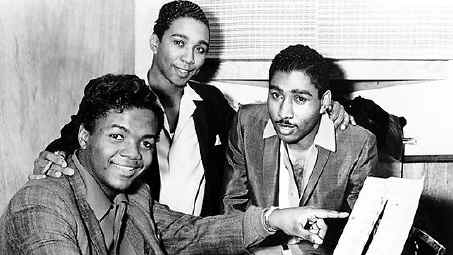
Holland-Dozier-Holland working on a song, 1965
The songwriting team of Brian Holland, Lamont Dozier and Eddie Holland joined forces in 1962 and perfected the formula of success that they discovered with their composition "Where Did Our Love Go."
The different singles also sound remarkably similar because of the in house rhythm section known as the Funk Brothers. In 1964, Earl Van Dyke, a former be-bop jazz pianist who toured with R&B singer Lloyd Price became the leader of the studio band. He played with drummer Benny Benjamin and bassist James Jamerson, who had backed Jackie Wilson and the Miracles. Together with a few other musicians the Funk Brothers provided the trademark percussive beat of the Motown sound
Gordy attempted to maintain consistent quality of Motown by conducting weekly meeting that scrutinized possible releases.
Gordy carefully promoted the songs that were released through means that kept the slick Motown image intact. Getting them spots on "The Ed Sullivan Show," "The Dean Martin Show," "The Tonight Show," "The Hollywood Palace," and "Orange Bowl Parade., the Copacabana in New York, exclusive Los Vegas hotels. He even had entertainers such as Sammy Davis Jr. and Broadway star Carol Channing write liner notes.
In 1960, between sets at a local club Gordy met Otis Williams when he walked into the bathroom. Elegants, the Questions, and the Distants. Renamed them the Temptations. Norm Whitfield, Smokey Robinson, Holland-Dozier-Holland formed the legendary Motown songwriting production crew.
During the mid-1960s, Gordy established a music empire that included eight record labels, a management service, a publishing company, and grossed millions of dollars a year From 1964 to 1967, Motown had 14 number one pop singles, 20 number one singles on the R&B charts, forty six more Top Fifteen pop singles and seventy-five other Top 15 R&B singles. In 1966 alone, seventy-five percent of Motown's releases made the charts.
In 1967 the Motown empire began to decline. A few days before a scheduled performance by the Supremes at the Hollywood Bowl in April, Gordy fired Florence Ballard, who had become jealous of the increasing prominent position of Diana Ross, and replaced her with Cindy Birdstrong. In July 1968, he fired David Ruffin of the Temptations and hired Dennis Edwards. Gordy quarreled about royalty rates with the the songwriting-production team of Holland-Dozier-Holland, who quit and filed suit against Motown.

Motown's L.A. offices
Suffering the departure of H-D-H, Berry Gordy began to concentrate on the career of Diana Ross as a solo act in 1970. Maintaining the company's success with The Jacksons, Gordy moved Motown to Hollywood in 1971 and established Motown Industries, expanding to Broadway musicals and films.
During the first half of the '70s, Diana Ross was established as Motown's first all-around entertainer through her work in super clubs and films. Motown suffered defections in the '70s with Martha Reeves recording solo for other labels in 1974 and The Four Tops signing with ABC/Dunhill. Gladys Knight and The Pips recording for Buddah beginning in 1974 and, in 1975 The Jackson Five moved to Epic, as did Michael Jackson in 1978. The Miracles, without Smokey Robinson, switched to Columbia in 1977 and The Temptations went to Atlantic. However, Motown retained its position as an important independent label with the recordings of Diana Ross, Marvin Gaye, Stevie Wonder, The Commodores, and Rick James.
During the '80s Motown struggled. Diana Ross moved to RCA in 1981 and Marvin Gaye signed with Columbia in 1982. The Temptations returned as did The Four Tops by the mid-'80s. The Gordy label introduced Debarge in 1983. The company staged a successful 25th anniversary celebration in 1983 that was later broadcast on ABC-TV. Motown Productions produced Lonesome Dove for CBS-TV in 1989. However, many former employees, including Eddie Holland and members of The Vandellas and The Marvelettes sued Motown, alleging failure to pay royalties.
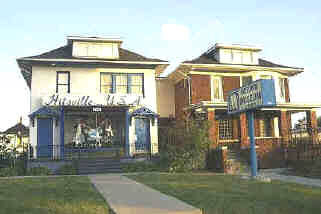
Motown Museum
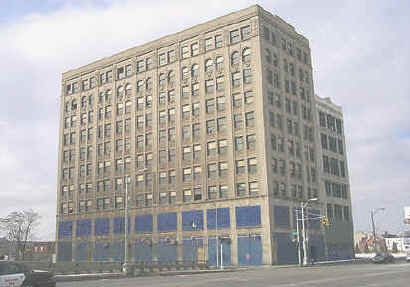
The Motown offices in Detroit
In 1985, Esther Gordy Edwards opened the Motown Historical Museum inside the restored Hitsville building offering tours. There were rumors that the former Motown building on Woodward would be used as a larger museum. However it still remains abandoned and boarded up as of the end of 2000.
In July 1988 Berry Gordy sold Motown Records to MCA and Boston Ventures for $61 million. Boston Ventures later bought out MCA's interest and sold Motown Records to the Dutch-based Polygram conglomerate for $325 million in 1993. In late 1994, Warner books published Gordy's self-serving biography To Be Loved.
Berry Gordy was inducted into the Rock and Roll Hall of Fame in 1990.
Berry Gordy's Motown Records

Founder and owner of the Tamla-Motown family record labels, Berry Gordy, Jr., established Motown Records as one of the most important independent labels in the early '60s. Assembling an industrious staff of songwriters, producers, and musicians, Motown Records built one of the most impressive rosters of artist in the history of pop music and became the largest and most successful independent record company in the United States by 1964.

Berry, Sr. and Bertha Gordy
On November 28, 1929 Berry Gordy was born at Detroit's Harper Hospital. Gordy was the seventh child born to Berry and Bertha Gordy. The Gordys an ambitious middle-class family with roots in Georgia farming and retailing.. The family moved to Detroit in the 1922 with their first three children. It was here that they established a successful painting and construction business that allowed the family to purchase a commercial building on the corner of St. Antoine and Farnsworth. Berry Gordy Sr. also opened the Booker T. Washington grocery store and from which he instilled the values of frugality, discipline, family unity and hard work that were so dear to Booker T. Washington. After studying business in college, Bertha co-founded the Friendship Mutual Life Insurance Company.

Berry Gordy dropped out of school in the eleventh grade to become a professional boxer. At one time he even fought on the same card with the Brown Bomber Joe Louis at Detroit's Olympia Stadium. He ended a his respectable career as a featherweight in 1950. After serving in the Army in Korea from 1951-1953 his love for jazz caused him to open up the 3-D Record Mart - House of Jazz. To obsessed with his own love of Jazz, Berry was to stubborn to stock the Blues records the neighborhood craved. So in 1955 the store went bankrupt and was forced to close.

Berry married married Thelma Coleman and quickly had three children. It was after the closing of the record store that Gordy went to work on the assembly line at Ford's Lincoln-Mercury plant. By 1957, he had quit that job to become a professional songwriter.

The Gordy sisters and mother: Esther, Anna, mother Bertha, Gwen and Lourye
The Flame Show Bar opened in 1949 and was located at the corner of John R and Canfield. The Flame was the showplace for top Black talent in Detroit during the 50s. Billie Holiday, T-Bone Walker, Wynonie Harris were a few of the many great black entertainers that appeared there. The Berry's were in charge of the photo concessions at the Flame. Sisters Gwen and Anna took the photos with brothers George and Robert developing the film. It was during this time the Al Green the club's owner invited Gordy to write songs for the artists he managed which included Jackie Wilson. Berry teaming with Roquel "Billy" Davis began writing at Green's office. Berry would eventually bring sister Gwen in and the trio would write several bestsellers "to Be Loved," "Lonely Teardrops," "That's Why (I Love You So)" and "I'll Be Satisfied" establishing themselves as hit writers. At this time Gordy started doing some of the producing.

Berry Gordy and second wife Raynoma Liles
One day Raynoma Liles and her sister Alice auditioned for Gordy. Not only did Gordy meet his next wife Raynoma, but he found a lady who could help him write hit records. Known around the company as Miss Ray, she had perfect pitch and could write lead sheets. They soon formed the Rayber Music Writing Company and for $100 they would do whatever was necessary to help a young singer make a record, be it writing, arranging, rehearsing or recording a demo. In this way they were able to find new talent. They also put together the Rayber Voices, a studio group that backed most of Motown's first acts on their early recordings.
In late 1957, Gordy had his first success with "Reet Petite," which was recorded by Detroit born Jackie Wilson, who had replaced Clyde McPhatter as lead singer of the Dominoes. The next year he wrote "Lonely Teardrops" for Wilson.
An unsuccessful audition of the Matadors for Wilson's manager Nat Tarnopol would change Gordy's life. Berry really like them a lot and told them so after the audition. This was to be the beginning of a close friendship between Gordy and the Matador's lead singer Smokey Robinson. The Matadors soon changed their name to the Miracles. Gordy managed the Miracles and produced their 1958 single "Got a Job" on the End Records label. The small royalty check he received from End along with similar small royalty checks for other hits he had co-written convinced him to form his own label Tamla Records. Originally he had wanted to call it Tammy after the Debbie Reynolds ballad, but the name had already been taken.

Berry's children Terry, Berry IV and Hazel (Jermaine's future wife) with the Beatles
In 1959 Gordy started his own publishing company Jobete Publishing named after his three children: Hazel Joy, Berry and Terry. If you wrote for Motown you were published by Jobete which grew to be one of the most powerful in the industry.

Mabel John, Motown's first female artist

A "45 from Anna Records, a label Berry and sisters Gwen and Anna started.

Barrett Strong, the man behind Motown's first top 40 hit, "Money (That's What I Want)" and later the co-songwriter of hits by The Temptations

Tamla Records' first 45" released by Detroit R&B legend Marv Johnson, Tamla's first recording act

Marv Johnson
Gordy initially recorded R&B artists on Tamla Records. He signed Mabel John, the gospel trained sister of blues singer Little Willie John. Gordy scored a minor hit with Tamla's first release, R&B singer Marv Johnson's "Come To Me." As the record picked up steam Gordy found he could not keep up with the demands of national production and distribution and leased the master to United Artists. Later in the first year of operation he co-wrote and produced "Money," which was recorded by Barrett Strong. Not yet equipped to break a national hit "Money" was released by Anna Records which was owned by his sister Gwen and her husband Harvey Fuqua. "Money" eventually reached the number two spot on the R&B Chart. In November 1959, Gordy recorded "Bad Girl" by a young William "Smokey" Robinson and the Miracles that reached number ninety-three on the pop charts with the help of national distribution by Chess Records.
Smokey Robinson convinced Gordy that Motown should distribute its own records. In 1960, Gordy co-wrote and distributed "Shop Around" by Smokey Robinson and the Miracles, which was a number one hit and established Motown as an important independent company. By this time Gordy had set up the Motown Record Corporation, Hitsville USA and Berry Gordy Enterprises. Jobette Music was his publishing firm and management agency International Talent Management, Inc. He also set up various subsidiary labels.
Through the next four years, Gordy continued to produce hits by capitalizing on the girl group craze. In 1959, a sixteen year old girl, Mary Wells, approached Gordy with a song she had written for Jackie Wilson. Unable to write music, Wells sang the song to Gordy, who immediately signed her and released her version of "Bye, Bye, Baby," which made the Top Ten on the R&B charts in 1960. Two years later she teamed with Smokey Robinson, who now wrote and produced for Tamla label and hit with "The One Who Really Loves You," "You Beat Me To Punch," and "Two Lovers." The next year she recorded "Laughing Boy" and "Your Old Stand By." In 1964 Wells topped the charts with "My Guy."

A Tamla 45" of the Marvelettes' "Please Mr. Postman"
Gordy also charted with the Marvelettes. Around 1961, one of their teachers arranged an audition with Gordy, after which he signed them and released "Please Mister Postman," which became Motown's first number one record. The next year the Marvelettes hit the charts with "Playboy," "Beachwood 4-5679," "Someday Someway," and "Strange I Know." In 1962 The group toured the South as part of the first Motortown Revue.
Encouraged by his success with the Marvelettes, Gordy recorded another Detroit girl group, Martha and the Vandellas. Martha Reeves, influenced by Clara Ward and jazz singer Billie Holiday, joined with Annette Sterling, Rosalind Ashford, and Gloria Williamson to sing as the Del-Phis while in high school and record the unsuccessful "I'll Let You Know" for Chess. In 1961 Reeves was hired as a secretary at Motown and by 1962 had convinced Gordy to record her group. The group sang backup vocals on a number of Motown hits including "Hitch Hike" and "Stubborn Kind of Fellow" by Marvin Gaye. Martha and the Vandellas hit the charts with "Come Get These Memories," followed by the million selling "Heat Wave" and "Quicksand." The next year they recorded "Dancing In the Streets" which reached near the top of the charts. Martha and the Vandellas, along with Mary Wells and the Marvelettes, identified Motown as a major source of the girl group sound.
Gordy, the son of a black entrepreneur who hoped for the upward mobility of blacks, specifically groomed and cultivated streetwise teens from the streets of Detroit to make them acceptable to Mainstream America. In 1964 he hired Maxine Powell, who had operated a finishing and modeling school, to prep his performers. Powell tried to transform Motown artists into polished professionals.

Motown choreographer Cholly Atkins on far left
A few months after adding Maxine Powell, Gordy hired choreographer Cholly Atkins, a well known dancer in the 1930s and 1940s who had performed at the Cotton Club and Savoy Ballroom, to teach these groups how to move gracefully
Atkins worked with Maurice King, who served as executive musical director. King who had arranged shows at Detroit's Flame Show Bar for years and had worked with jazz artists such as Billie Holiday and Dinah Washington, taught the Motown groups about stage patter.

Motown recording stars on the road in England
By the mid-1960s, Gordy had assembled a Motown team that could take poor black youths from Detroit and teach them to talk, walk, dress as successful debutantes and debonair gentleman
Gordy combined the polished images of the Motown acts with a gospel-based music that could appeal to mainstream America. Blues and R&B always had a funky look to it back in those days, and Motown wanted to have a look that fathers and mothers would want their children to follow. They wanted to kill the imagery of liquor and drugs and how some people thought it pertained to R&B. Therefore when they reject anything that had a strong blues sound to it when choosing material for their artist.
In place of the blues and R&B, Gordy favored a distinct music grounded by an insistent pounding rhythm section, punctuated by horns and tambourines and featuring shrill, echo-laden vocals that bounced back and forth in a call and response of gospel. Building upon his experience with the girl group sound, he produced a full sound reminiscent and expanding on Phil Specter's Wall of Sound.

Motown complex on West Grand Boulevard

2657 West Grand Boulevard
After he purchased 2644-2246 West Grand Boulevard in April of 1961 he placed Jobete, the sales, shipping and public relations departments in it. In January of 1962 2650-2652 West Grand Boulevard was added to house Berry and his sister Esther's offices International Talent Management. From 1965 on 2656 hosed finance department; 2662-64 purchased the next year was home to the sales and marketing. 26666-68 was bought at the same time. ITMI was moved to 2670-72 after it was bought in late 1966. Across the street, 2657 was converted into Artist Development Department in early 1966.
Aiming for the mass market, Gordy called the music "The Sound of Young America" and affixed a sign over Motown studio that read "Hitsville U.S.A."
Berry Gordy, using methods practiced in Detroit auto factories, ensured the continued success of the Supremes by assembling parts of a hit making machine, that included standardized song writing, an in house rhythm section, a quality control process, selective promotion and a family atmosphere reminiscent of the paternalism of Henry Ford in his auto plants in the early twentieth century.

Holland-Dozier-Holland working on a song, 1965
The songwriting team of Brian Holland, Lamont Dozier and Eddie Holland joined forces in 1962 and perfected the formula of success that they discovered with their composition "Where Did Our Love Go."
The different singles also sound remarkably similar because of the in house rhythm section known as the Funk Brothers. In 1964, Earl Van Dyke, a former be-bop jazz pianist who toured with R&B singer Lloyd Price became the leader of the studio band. He played with drummer Benny Benjamin and bassist James Jamerson, who had backed Jackie Wilson and the Miracles. Together with a few other musicians the Funk Brothers provided the trademark percussive beat of the Motown sound
Gordy attempted to maintain consistent quality of Motown by conducting weekly meeting that scrutinized possible releases.
Gordy carefully promoted the songs that were released through means that kept the slick Motown image intact. Getting them spots on "The Ed Sullivan Show," "The Dean Martin Show," "The Tonight Show," "The Hollywood Palace," and "Orange Bowl Parade., the Copacabana in New York, exclusive Los Vegas hotels. He even had entertainers such as Sammy Davis Jr. and Broadway star Carol Channing write liner notes.
In 1960, between sets at a local club Gordy met Otis Williams when he walked into the bathroom. Elegants, the Questions, and the Distants. Renamed them the Temptations. Norm Whitfield, Smokey Robinson, Holland-Dozier-Holland formed the legendary Motown songwriting production crew.
During the mid-1960s, Gordy established a music empire that included eight record labels, a management service, a publishing company, and grossed millions of dollars a year From 1964 to 1967, Motown had 14 number one pop singles, 20 number one singles on the R&B charts, forty six more Top Fifteen pop singles and seventy-five other Top 15 R&B singles. In 1966 alone, seventy-five percent of Motown's releases made the charts.
In 1967 the Motown empire began to decline. A few days before a scheduled performance by the Supremes at the Hollywood Bowl in April, Gordy fired Florence Ballard, who had become jealous of the increasing prominent position of Diana Ross, and replaced her with Cindy Birdstrong. In July 1968, he fired David Ruffin of the Temptations and hired Dennis Edwards. Gordy quarreled about royalty rates with the the songwriting-production team of Holland-Dozier-Holland, who quit and filed suit against Motown.

Motown's L.A. offices
Suffering the departure of H-D-H, Berry Gordy began to concentrate on the career of Diana Ross as a solo act in 1970. Maintaining the company's success with The Jacksons, Gordy moved Motown to Hollywood in 1971 and established Motown Industries, expanding to Broadway musicals and films.
During the first half of the '70s, Diana Ross was established as Motown's first all-around entertainer through her work in super clubs and films. Motown suffered defections in the '70s with Martha Reeves recording solo for other labels in 1974 and The Four Tops signing with ABC/Dunhill. Gladys Knight and The Pips recording for Buddah beginning in 1974 and, in 1975 The Jackson Five moved to Epic, as did Michael Jackson in 1978. The Miracles, without Smokey Robinson, switched to Columbia in 1977 and The Temptations went to Atlantic. However, Motown retained its position as an important independent label with the recordings of Diana Ross, Marvin Gaye, Stevie Wonder, The Commodores, and Rick James.
During the '80s Motown struggled. Diana Ross moved to RCA in 1981 and Marvin Gaye signed with Columbia in 1982. The Temptations returned as did The Four Tops by the mid-'80s. The Gordy label introduced Debarge in 1983. The company staged a successful 25th anniversary celebration in 1983 that was later broadcast on ABC-TV. Motown Productions produced Lonesome Dove for CBS-TV in 1989. However, many former employees, including Eddie Holland and members of The Vandellas and The Marvelettes sued Motown, alleging failure to pay royalties.

Motown Museum

The Motown offices in Detroit
In 1985, Esther Gordy Edwards opened the Motown Historical Museum inside the restored Hitsville building offering tours. There were rumors that the former Motown building on Woodward would be used as a larger museum. However it still remains abandoned and boarded up as of the end of 2000.
In July 1988 Berry Gordy sold Motown Records to MCA and Boston Ventures for $61 million. Boston Ventures later bought out MCA's interest and sold Motown Records to the Dutch-based Polygram conglomerate for $325 million in 1993. In late 1994, Warner books published Gordy's self-serving biography To Be Loved.
Berry Gordy was inducted into the Rock and Roll Hall of Fame in 1990.
Last edited:
